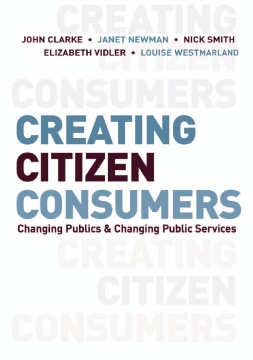
BOOK
Creating Citizen-Consumers
John Clarke | Janet Newman | Nick Smith | Elizabeth Vidler | Louise Westmarland
(2007)
Additional Information
Book Details
Abstract
`This is an illuminating and topical study, which skilfully blends together theoretical and empirical analysis in search of the "citizen-consumer". It should become a key text for all with an interest in public service reform and the "choice" agenda, as well as consumerism and citizenship' - Ruth Lister, Professor of Social Policy, University of Loughborough
Political, popular and academic debates have swirled around the notion of the citizen as a consumer of public services, with public service reform increasingly geared towards a consumer society. This innovative book draws on original research with those people in the front-line of the reforms - staff, managers and users of public services - to explore their responses to this turn to consumerism.
Creating Citizen-Consumers explores a range of theoretical, political, policy and practice issues that arise in the shift towards consumerism. It draws on recent controversies about choice to examine the tensions of modernising public services to meet the demands of a consumer society. The book offers a fresh and challenging understanding of the relationships between people and services, and argues for a model based on interdependence, respect and partnership rather than choice.
This original book makes a distinctive contribution to debates about the future of public services. It will be of interest to those studying social policy, cultural studies, public administration and management across the social sciences, as well as for those working in public services.
John Clarke is a Professor of Social Policy at the Open University. Janet Newman is a Professor of Social Policy at the Open University. Nick Smith is a Research Officer in the Personal Social Services Research Unit at the University of Kent. Elizabeth Vidler is a Project Officer in the Faculty of Social Sciences at the Open University. Louise Westmarland is a Lecturer in Criminology at the Open University.
Table of Contents
| Section Title | Page | Action | Price |
|---|---|---|---|
| 1 Introduction 9 | |||
| 2 Putting evaluation in context 13 | |||
| 3 Traditional and alternative models of evaluation 19 | |||
| 5 Putting evaluation into practice 29 | |||
| 6 Some practical considerations when planning an evaluation 56 | |||
| 7 Using evaluation: feedback and follow-up 69 | |||
| Appendix 1 Checklists of questions 73 | |||
| Appendix 2 Developing an evaluation plan 77 | |||
| Appendix 3 Tasks for the team leader 79 | |||
| Appendix 4 Suggestions for the content of an evaluation report 81 | |||
| Appendix 5 Advantages and disadvantages of internal and external evaluators 83 | |||
| References and further reading 85 | |||
| Index 91 |
